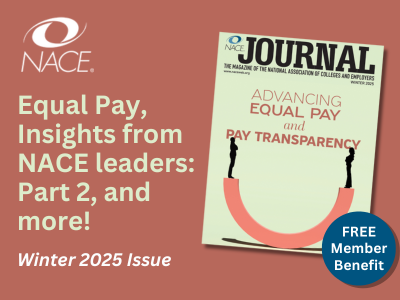Summary
This advisory opinion, which draws from all five of the Principles for Ethical Professional Practice, addresses:
- Career center development of policies/guidelines to govern an employer’s access to the institution’s students for employment recruitment purposes;
- The perceived or real obligation of career centers to vet employers;
- Providing constituent access to recruiting policies/guidelines, as well as career center roles and responsibilities around providing access to employers and employment opportunities;
- Ensuring clear understanding of career center policies/guidelines when discussing recruiting strategy with current or potential employers, including alumni;
- Addressing concerns with employers; and
- Maintaining neutrality when counseling/coaching students regarding employers and employment opportunities.
Introduction
By supporting appropriate recruitment and employment practices, career services can play a key role in ensuring positive connections between employers and students. As a cornerstone of that support, career centers should develop policies/rules that govern an employer’s access to their institution’s students for employment recruitment purposes.
To that end, the career center should engage in dialogue with the institution’s legal counsel and the career center leader’s immediate supervisor prior to implementing such policies. Employer advisory boards could also be included in this discussion. Employers that fail to abide by the appropriate policies/rules may be denied access to the school’s students for recruitment purposes.
Professional Perspectives
The Principles for Ethical Professional Practiceprovide two basic precepts that spell out core values and the philosophy of the career services and employment profession:
- Maintain a recruitment process that is fair and equitable; and
- Support informed and responsible decision making by candidates.
The Principles for Ethical Professional Practice offer guidance when it comes to the intent to treat employers and students fairly:
- Principle 1: Practice reasonable, responsible, and transparent behavior.
- Principle 2: Act without bias.
- Principle 3: Ensure equitable access.
- Principle 4: Comply with laws.
- Principle 5: Protect confidentiality.
A Career Center’s Responsibility
While career centers typically do not endorse specific organizations, the posting of employer positions or their inclusion in career center events, services, or programs may imply to students that the career center has vetted the employers and that students can feel comfortable applying to these organizations.
Individual campuses may set policy about the criteria for hiring organizations to have access to students through career center communication and recruitment channels. For example, if a career center has concerns that an organization is engaging in fraudulent business practices or discriminatory practices, the career center may feel justified in denying the employer access to its services. Additionally, if the career center cannot verify that the employer is a legitimate business, the career center may deny the employer access to campus recruitment services. In practice, career centers should post a disclaimer acknowledging that they have attempted to make a good faith effort to vet all employers but that, as scams are a reality, students have a shared responsibility in researching each opportunity they are considering and that not all employers are vetted by the career center. The disclaimer should also specifically indicate that by using the services, the student is holding the career center harmless from any and all claims that may arise. The career center should work with legal counsel to develop appropriate language. A best practice for career centers is to make available resources about scams and fraudulent recruiting, and how to identify these types of activities.
One of NACE’s core concepts is that the career center should support the student in making an informed and responsible decision. By limiting an organization’s access to students or intentionally pointing out reasons students should be cautious, a career center could interfere with students’ ability to implement their career self-concept and could even impose the beliefs of career center staff upon students. Moreover, an organization limited in this manner might maintain that the recruitment process is not fair to them by pointing to the second precept, namely “Maintain[ing] a recruitment process that is fair and equitable.” Consequently, the career center should consider its criteria for access carefully to ensure it is acting without bias.
Conversely, if a career center is aware of specific, verified issues with an employer or complaints of discrimination/harassment made by interns or former students, the career center may have an obligation to prevent the employer from promoting opportunities through the career center or using its services. It should be noted that a career center may be exposed to legal liability to the extent it becomes aware of issues at a workplace, e.g., discrimination, harassment, assault, or other illegal activities, and continues to send students to that location who are then subject to a similar occurrence. A career center should consult with its Title IX coordinator prior to taking any such action; legal counsel may also be involved at the university’s discretion.
Suggested Steps When Working With Employers
1. Develop a set of employer/recruitment policies for the career center, have them reviewed by the career center leader’s supervisor and, if appropriate, by university counsel, post them on the career center website, and share them as a standard policy with all employers recruiting through the career center. Refer to the NACE Principles for Ethical Professional Practice and/or include them as a part of the career center’s policies.
2. Make reasonable efforts to ensure that all organizations recruiting through the career center have been informed of office and university policies related to recruiting, including an understanding of and an emphasis on equity and inclusion.
3. If there are any concerns regarding a specific employer, the organization should be contacted. Frank discussions between career centers and organizations that are interested in recruiting the institution’s students will help to clarify policies and expectations. If available, career center staff may want to use alumni contacts within the organization to discuss concerns. If the concerns remain unresolved, then supervisors or other appropriate officials within the company should be contacted. If that fails to resolve the concerns, the career center should follow the steps outlined in the institutional or office policy related to how work with the employer should proceed. Regardless, all communications should be documented in the event that a legal issue arises between the parties.
4. Based upon the circumstances, a career center should develop customized intervention plans regarding fraudulent employment practices, discriminatory recruiting practices, student complaints against an employer, and allegations of harassment. A best practice for career centers in these situations is to consult with their Title IX coordinator and/or legal counsel (if appropriate) who may refer career center staff to additional individuals and/or resources.
SUGGESTED STEPS WHEN COACHING STUDENTS ABOUT REVIEWING OPPORTUNITIES
1. Educate students, without value judgment, to make informed decisions regarding on-campus recruting orientations and job-search employment opportunities. Use a variety of tools, including publications, online resources, office workshops, and individual appointments with the career center. A best practice would be to have guidance for students in situations of fraudulent, unethical, or discriminatory employment activity.
2. When teaching students how to search for employment, provide pointers on how to assess the appropriateness of positions and how to ask the right questions of employers.
3. Recommend that students have a trusted third party review any employment contracts or offer terms before signing them. Students could ask a career center professional or a trusted individual to review any employment contracts or offer terms before signing them with the knowledge that these individuals are not attorneys and cannot provide legal advice.
Reviewed and revised by the 2022-23 Principles for Ethical Professional Practice Committee.



